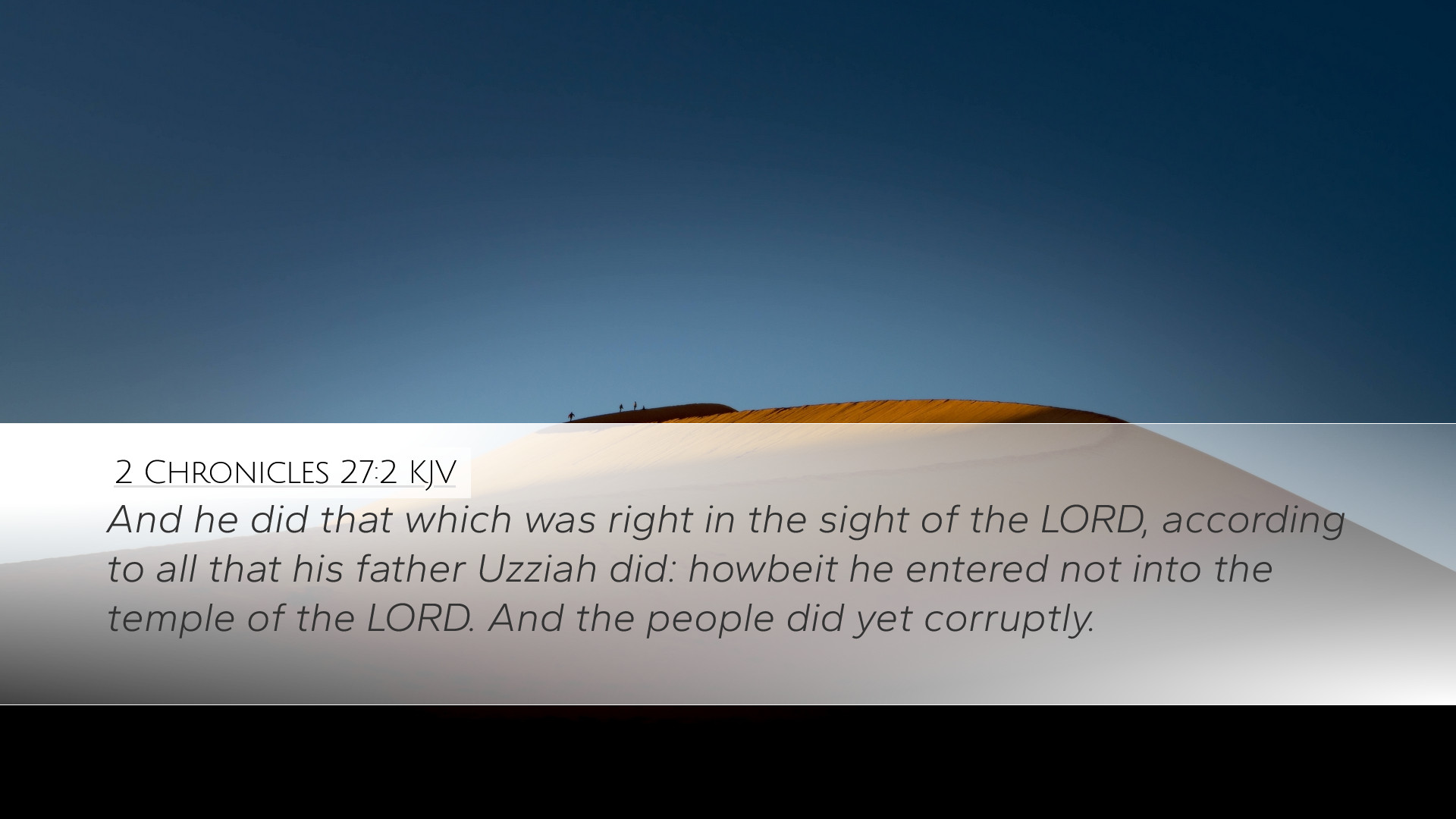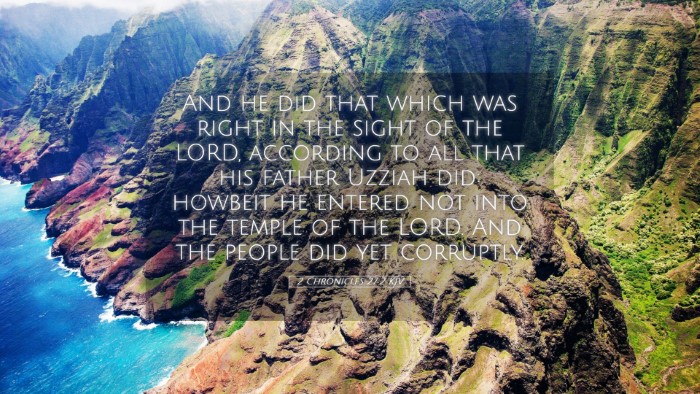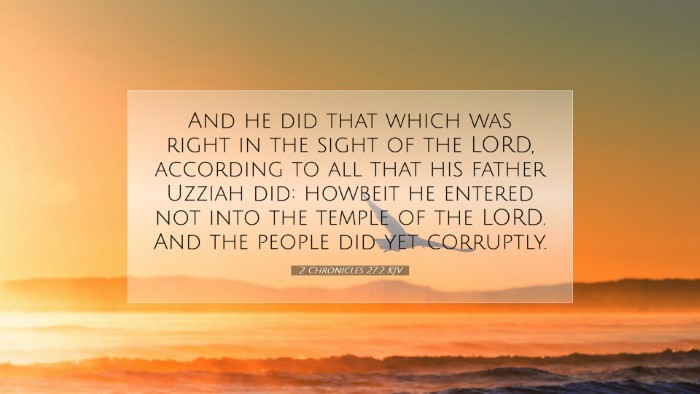Commentary on 2 Chronicles 27:2
2 Chronicles 27:2 states: "And he did that which was right in the sight of the Lord, according to all that his father Uzziah did: howbeit he entered not into the temple of the Lord. And the people did yet corruptly."
Overview
This verse reflects on the reign of Jotham, the son of Uzziah, highlighting both his positive actions and the continuing corruption among the people. The juxtaposition of Jotham's righteousness with the people's corrupt behavior presents a significant theme in Chronicles.
Insights from Public Domain Commentaries
Matthew Henry Commentary
Matthew Henry emphasizes the commendable qualities of Jotham’s reign. He points out that Jotham walked in the ways of his father Uzziah, which indicates a continuity of righteous leadership. However, Henry notes the critical lack of personal piety as Jotham did not enter the temple of the Lord. This reflects a significant spiritual deficiency, as participation in temple worship was crucial for any king in ancient Israel.
- Continuity of Righteousness: Jotham’s adherence to his father’s practices acted as a stabilizing force in the kingdom.
- Spiritual Caution: His distance from the temple suggests an acknowledgment of God’s holiness and perhaps a conscious decision to avoid presumption in worship.
- Corruption Among the People: The statement that "the people did yet corruptly" highlights that despite Jotham’s righteousness, widespread apostasy remained a significant issue.
Albert Barnes Notes
Barnes provides a detailed exploration of the biblical context of Jotham's actions. He notes the importance of Uzziah's legacy and states that Jotham's righteousness can be seen as a continuation of that legacy. However, Barnes expresses concern regarding the phrase "the people did yet corruptly," illustrating the struggle between the king's righteous governance and the people's infidelity. This indicates a dichotomy where the personal piety of the king was not mirrored in the populace.
- Covenant Responsibility: The need for the king to lead in devotion is critical for the nation's overall spiritual health.
- The Role of Leadership: Jotham’s actions reveal the weight of leadership in fostering a culture of faithfulness.
- The Persistent Challenge of Idolatry: This note serves as a reminder that strong leadership needs to actively combat spiritual apathy.
Adam Clarke's Commentary
Adam Clarke elaborates on the specifics of Jotham's character and reign. He mentions that while Jotham is esteemed for doing that which was right, his neglect of entering the temple signifies a profound respect for divine authority. Clarke emphasizes that while one can act righteously, the absence of worship underlines the necessity of a relationship with God in a more profound context than mere obedience.
- Faith and Action: Jotham's actions reflect a complex interplay between faithfulness in action and worship.
- Theological Insight: The absence of worship in the temple contextually signifies an incomplete expression of faith.
- Sociological Reflection: The verse provides insights into how societal behavior can diverge from leadership, suggesting a deep-rooted issue of communal conviction.
Theological Reflection
The verse invites deeper theological reflection regarding the nature of true worship and the implications of leadership. Jotham’s commendable actions contrasted with the people's corruption serve as a poignant reminder of the challenges faced in maintaining both personal integrity and communal faithfulness.
Leadership and Spiritual Health
In considering the implications for contemporary leadership, we find that leaders must cultivate personal holiness and engage in corporate worship. There is a challenge where societal behaviors may contradict the spiritual values espoused by leadership. The importance of guiding people in the ways of the Lord is underscored, as positive actions alone are insufficient if not coupled with a vibrant communal faith.
Personal Worship and Community
Another point for consideration is the importance of personal worship. Jotham’s hesitance to fully engage with the temple rituals emphasizes that leaders, while acting rightly, must also participate personally in the life of faith. The neglect of this vital aspect potentially leads not only to personal spiritual deficit but also affects the people collectively.
Conclusion
2 Chronicles 27:2 serves both as a commendation of righteous leadership and a cautionary tale about the dangers of societal corruption. The commentary synthesizes insights from Matthew Henry, Albert Barnes, and Adam Clarke, revealing the multifaceted nature of righteousness in leadership. For contemporary pastors, theologians, and scholars, this verse not only underscores the personal responsibilities of leaders but also highlights the necessity of engaging the community in authentic worship. Therefore, as we reflect on Jotham's reign, may we aspire towards a faithful expression of justice, righteousness, and devotion to God in all our endeavors.


